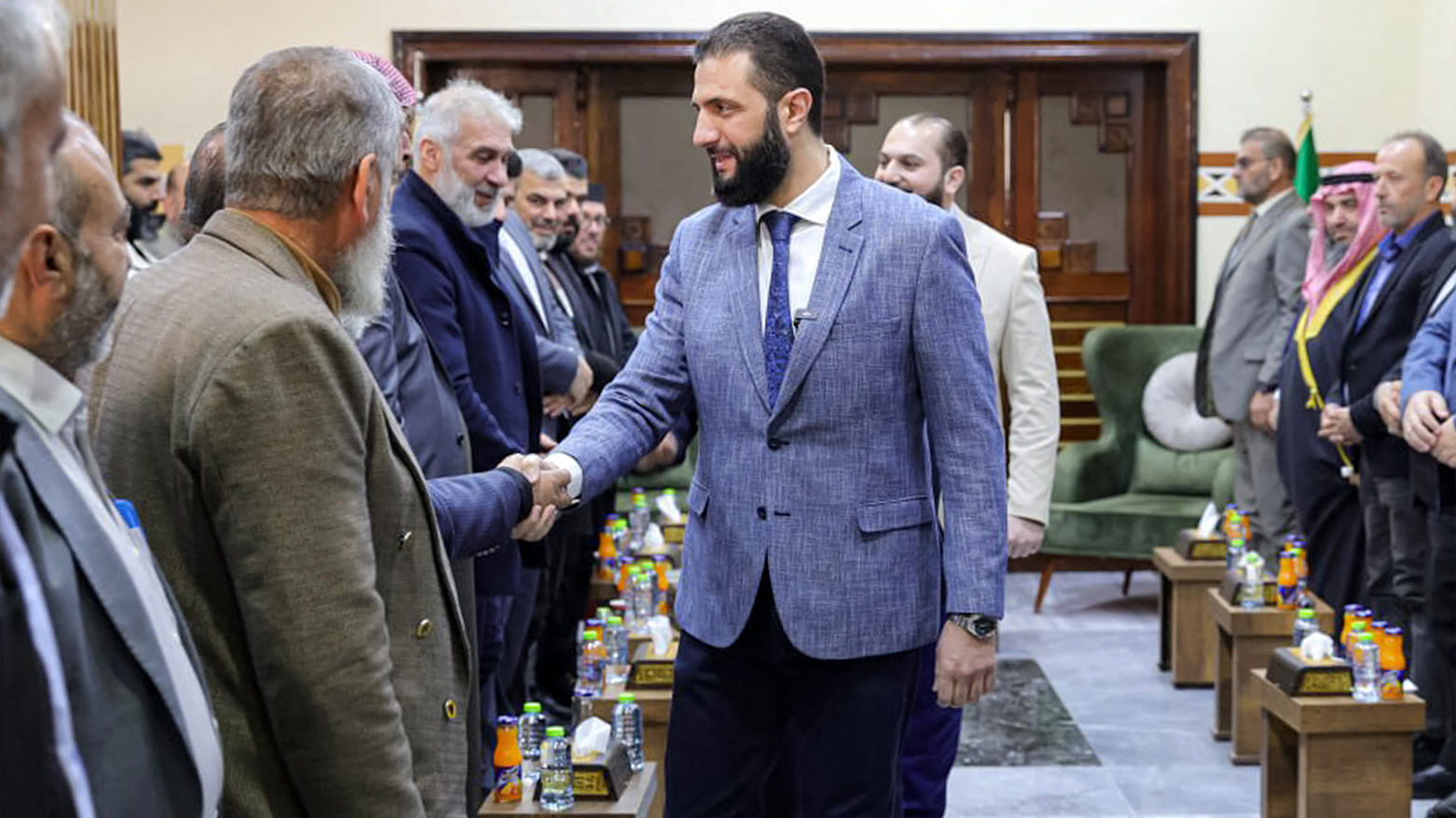Syrian Transitional President Visits Afrin
ENKS’s Afrin branch released a statement detailing the concerns raised by Ahmed Hassan. Chief among them were ongoing violations against Kurdish civilians, including land seizures, forced displacements, and arbitrary detentions.

ERBIL (Kurdistan24) – In a visit to Afrin, Ahmed al-Sharaa, President of Syria’s transitional government, met with Kurdish leaders and local activists on Saturday to discuss pressing issues affecting the region’s Kurdish population.
This visit, part of his broader tour of Aleppo and Idlib provinces, marks the first time a Syrian leader has officially engaged with Kurdish representatives in Afrin since the fall of Bashar al-Assad’s regime.
During his visit, al-Sharaa held discussions with Ahmed Hassan, head of the Kurdish National Council in Syria’s (ENKS) Afrin branch, alongside civilian residents and activists.
The meeting centered on the current security situation in Afrin, which has faced instability and human rights violations since falling under the control of various armed groups.
Following the discussions, ENKS’s Afrin branch released a statement detailing the concerns raised by Ahmed Hassan. Chief among them were ongoing violations against Kurdish civilians, including land seizures, forced displacements, and arbitrary detentions.
Hassan presented a comprehensive account of these abuses and urged al-Sharaa to take immediate steps to address them.
Hassan emphasized the urgent need to expand governmental authority in Afrin to facilitate the city’s liberation from armed groups and the establishment of rule of law, justice, and equality.
He also called for a framework to ensure the return of displaced Kurds and the restitution of their properties.
A Call from the People of Afrin
During the meeting, Ahmed Hassan delivered a speech addressing President al-Sharaa on behalf of Afrin’s people. He welcomed Sharaa’s leadership in Damascus and emphasized the hopes of Afrin’s residents for justice, equality, and freedom in post-Assad Syria.
Hassan stressed that despite the fall of the previous regime, injustices persist in Afrin. He called for immediate action on several critical issues, including:
1- The widespread deforestation in Afrin’s countryside, particularly in Qazqli (Jindires district), Sheikh Hadid, Meydan Ekbis, and other areas, where trees are being cut down for commercial purposes, leading to severe environmental consequences.
2- The continued detention of Kurdish prisoners and their status in Afrin, Marea, Azaz, and Hewar Killis prisons , despite the release of detainees across Syria following Assad’s fall.
3- The targeting of returning displaced persons, many of whom have faced arrests and financial extortion when attempting to return to Afrin from cities like Aleppo and Damascus or from abroad.
4- The vandalism of homes once belonging to displaced Kurds, with critical infrastructure like doors, windows, and water tanks being stolen.
5- The imposition of illegal taxes by armed factions such as the Hamzat and Amshat groups, who arrest and harass civilians unable to pay.
6- The occupation of homes by armed groups, with returning families forced to pay exorbitant sums in U.S. dollars to reclaim their properties.
Hassan urged al-Sharaa’s government to assert full control over Afrin, dismantle militia rule, and restore justice and equality to the region, in line with the principles of the Syrian revolution.
Sharaa’s Commitments
Kurdistan24 has learned that al-Sharaa pledged to take concrete steps in response to the grievances presented by ENKS and the people of Afrin.
He assured Kurdish leaders and activists that his administration is committed to restoring Afrin’s stability and ensuring the return of confiscated properties to their rightful owners.
Political analysts suggest that al-Sharaa’s visit signals a strategic shift in his government’s approach to Kurdish communities in Western Kurdistan.
His engagement with Kurdish leadership and public acknowledgment of their grievances may indicate an effort to rebuild trust and foster a more inclusive governance model in post-Assad Syria.
A Message to Western Kurdistan
Observers note that al-Sharaa’s trip to Afrin represents more than a diplomatic gesture—it is a direct signal to the Kurdish population that their concerns will be acknowledged in Syria’s transitional period.
This development is particularly significant given the historical marginalization of Kurds under previous Syrian administrations.
While the full impact of al-Sharaa’s pledges remains to be seen, his visit marks a milestone in the evolving relationship between Syria’s transitional government and its Kurdish population.
As discussions continue, Kurdish residents of Afrin and beyond will closely watch whether al-Sharaa’s administration delivers tangible improvements on the ground.